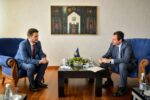Kosovo and Serbia have not been able to agree on the issue of the Serbian dinar, which was banned in Kosovo, even after the third meeting in a row on Thursday in Brussels, confirmed the chief negotiators of both countries, who accused each other of a lack of will to find a solution. “Unfortunately, even today we had big differences”, said the chief negotiator of Kosovo, Besnik Bislimi, speaking to journalists after the meeting with his Serbian counterpart, Petar Petkovic, under the mediation of the EU envoy for dialogue, Miroslav Lajçak.
“While the Kosovar side has been discussing the options for how the Kosovo Serbs can receive financial support from Serbia even further, the Serbian side has been working as a lawyer for Postanska banka (Serbian Post Office Savings Bank) and all the time has been discussing how to license it” , Bislimi said. Meanwhile, Serbia’s chief negotiator, Petar Petkovic, said that Pristina did not show “sufficient will” for an agreement and that another meeting is expected on this topic. “We once again reiterated our position and proposal, which is balanced and implies a compromise solution. On the other hand, there was not enough will on the part of Pristina. I will not talk more about this, since there will be another meeting on this topic”, he said.
In the last meeting in Brussels, Petkovic had said that the Serbian side will try to continue the operation of the bank of Serbia in Kosovo, Kursimora e Posta, so that the Serbs receive salaries, pensions and other assistance. Petkovic also emphasized that he expects Lajcak to issue a new invitation for discussions on payments within ten days. “Then we will see how things will develop”, he added.
He repeated that this issue would be resolved if there was an Association of municipalities with a Serbian majority in Kosovo. Earlier Thursday morning, Lajcak held a bilateral meeting with Serbian chief negotiator Petkovic. The use of the dinar for cash payments in Kosovo was banned on February 1, when the Central Bank of Kosovo implemented a new regulation that designated the euro as the country’s sole official currency. The European Union, which facilitates dialogue between Kosovo and Serbia in Brussels, hoped that the differences in approach between the parties would be overcome and a solution would be reached, according to which Serbian citizens in Kosovo would be able to continue receiving benefits from Serbia.
This issue, apart from angering Serbia, also provoked disagreements between the Government of Kosovo and the international community, since the Serbian community in Kosovo, for years, receives payments in dinars from the budget of Serbia. Western diplomats asked Kosovo to suspend the regulation, to give affected citizens time to adapt to the new practice. Today’s meeting was the third in recent weeks between the chief negotiator of Kosovo, Besnik Bislimi, and that of Serbia, Petar Petkovic, while the fourth in general for this issue in Brussels. In the meetings so far, according to the EU, the parties have presented their proposals for finding a practical and short-term solution for Serbian citizens in Kosovo who are paid in dinars by Serbia.
However, there were differences between the parties, which is why this meeting was called today, Thursday, in an effort to find a solution. The Government of Kosovo insists that the decision of the CBK is not political, but of an independent institution. However, she expressed her readiness for a practical solution that would help the citizens, but without questioning the CBK’s decision. In an interview given to REL in March, the prime minister of Kosovo, Albin Kurti, said that proposals for the dinar that are contrary to the CBK regulation will not be accepted. EU sources have said that they hope to reach a solution, but have reiterated that this, above all, will depend on the readiness of the parties.
According to the new regulation of the Central Bank of Kosovo, for operations with cash, which comes into force on February 1, 2024, the only currency allowed for making payments in Kosovo is the euro.
“The only currency allowed to be used for carrying out cash payment transactions and in the payment system in the Republic of Kosovo is the euro, as the only currency also in the sense of Article 11 of the Constitution of the Republic of Kosovo and Articles 16, 17 and 18 of Law No. 03/L-209 for the Central Bank of the Republic of Kosovo” – the new regulation states.
CBK has clarified that “other non-euro currencies in Kosovo can be used as value for storage in physical form or in bank accounts in non-euro currencies, for making international payments in non-euro currencies and for foreign exchange activities”.
But no currency other than the euro can be used as a means of payment in the Republic of Kosovo.








